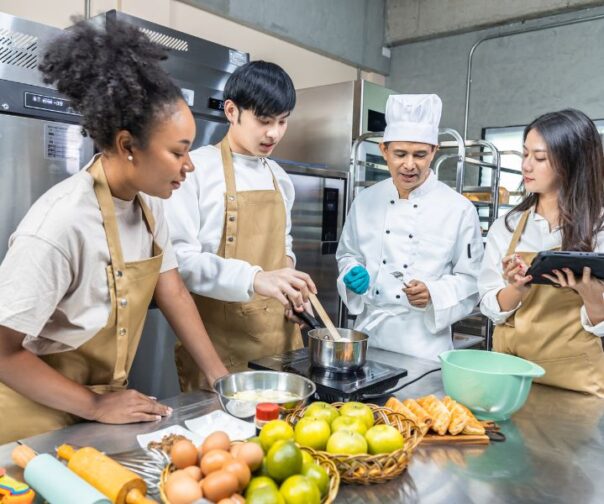There are many different directions you can take when starting your own cooking classes. And the decision is often defined by your interests, experience, availability, and budget.
Depending on these factors, you can define what, where, and when. WHAT are the requirements you need to follow, the skills you will be teaching, the atmosphere you aim to create. WHERE is the most appropriate location or venue for your classes based on the above decisions. And of course, WHEN are the sessions going to be – how often, during what time of the day, for how many weeks or months.
Answering the above questions will be the first step towards creating an effective business plan. Following your initial thoughts and short-term goals, you will be able to easily define more challenging decisions going forward.
Although it seems like a simple and pleasant idea to develop, establishing a cooking class business requires some good preparation. Get ready to consider a number of important factors before enjoying the excitement of teaching your first class. Our list covers the most important steps that every future entrepreneur must take into account.
1. Follow your passion
Before making any major decisions and plans, spend a minute thinking about your strengths and areas of expertise. When it comes to art, what we believe culinary science is, knowledge and passion are essential.
So choose the option that will keep you close to your favorite aspects of cooking where inspiration and excitement will be never-ending.
Try not to ignore the fact though, that if you aim to achieve long-term success, you will require an on-going stream of people with similar interests. When it comes to teaching something too unique or unusual, it might be a better idea to do it in a one-off special class instead of devoting a few months and an entire course to it.
2. The inevitable: business licenses and permits
First and foremost, find out whether you need a license to be able to run your own cooking classes. Obtaining a legal document to validate your business or practice can be slow so don’t leave it till the end.
You might not need any formal qualifications to start teaching cooking tutorials and classes. Still, keep in mind that you will need some experience to succeed. So in addition to any legal permits, make sure you feel prepared to teach people who are absolute beginners in your field.
3. Do your homework before you get started
Research is essential for every new business and cooking classes are not an exception. Make an effort to learn as much as you can about running the day-to-day operations of your business (this guide is a good first step).
Contact your local health department and find more about the relevant facility, equipment and safety requirements. Take time to understand the application of those regulations in different environments.
For example, you might be expected to upgrade your fire alarms and security system to comply with regulations. And finding a suitable facility to run your classes may take longer than you expect.
Spend some time looking into the current market demands and more specifically those new skills that people in your area want to learn or upgrade. As we said above, stay close to your passion but try to do it in a way that accommodates others’ interests and curiosities.
4. Define your goals and objectives
Now that you have a clear idea of what it takes to start your own cooking class business, take a moment to look at the bigger picture.
What are your short and long-term goals? Do you want to teach classes during your free time, or this would be the ideal full-time job you’ve always dreamed of? How much are you expecting to earn and what can you sacrifice in order to achieve your expectations?
Setting clear goals and objectives will prepare you for the challenges this new career path has ‘cooked’ for you!
Would you like your guests to book your cooking classes on your website? This idea might bring you much more traction and visitors than offline promotion and save valuable time you might have spent by filling in spreadsheets and accepting payments manually. If that’s the case, try Regiondo – it’s an online booking system for cooking classes that will help you put your business on the right track. Book a live demo and see how it works – no strings attached.
5. Think about budgeting
It’s never too early to set your budget and expected earnings. Consider the amount you can invest as well as all relevant costs. Don’t forget to price the class accordingly so you can easily cover food, labor, and other expenses.
Recommended reading: How to Create a Business Budget in 5 Simple Steps
6. Choose a suitable facility
Can you afford the costs for a fully equipped commercial kitchen of your own, or you might need to rent a space when you first start? Based on the budget you’ve already set up, consider the alternatives you can afford.
School kitchens are among the great cheap options. So is your own home, especially if your classes are about preparing home-cooked meals and traditional food. You can also talk to your local university about running evening courses which are a win-win solution for both sides.
For those with a higher spending limit, consider building custom spaces suitable for the class content and activities. Make sure to Integrate health department requirements into the facility, such as having separate sinks for dishes, staff toilets, and prep spaces.
7. Sort out the equipment
Whether you are using an existing and fully furnished venue or building a bespoke one, the equipment is a must. Before you start, run a test class so any potential gaps in equipment become visible. Make sure you buy enough equipment and some extra on top for when things break. The condition of tools and utensils should be immaculate in order to maintain a clean and professional class environment.
8. Start marketing and promotion
Marketing is essential for achieving a constant stream of class attendants, especially if you are based in a bigger city with more competition. Build an engaging website full of high-quality images of dishes and meals prepared by you. Highlighting the best advantages of your classes as well as the quality time your clients are having in a short but professional video.
Organize free events for your potential clients. This will be a great chance for you to demonstrate your skills and engage interested people. A free event will also give you a realistic perspective on teaching and let you exercise and improve. In addition to teaching your own class, try attending workshops and tutorials by other professionals to see what they do differently.
Spread the word to friends and promote your offers using social media. Share discount codes, exciting videos, and close up shots of meals prepared by your students. This way you will showcase the exciting experiences people can enjoy in your cooking class.
Recommended reading: 10 Successful Strategies To Promote Your Cooking Classes
9. Keep a positive attitude
A cooking class is attended by a range of people with different proficiencies. From beginners to semi-professionals, they are all coming to learn and have fun in a pleasant environment. So make your classes an interactive and fun social event rather than a boring educational class. Allow everyone to combine experimenting with socializing and be kind when criticizing. You should, of course, remain the “expert” in the room but be friendly and understanding when things go wrong.
10. Follow space, health, and safety requirements
Last but not least comes the conversation about all legal regulations related to starting your own cooking class business. We recommend having a conversation with a legal practitioner to get everything from insurance to refund policy and business hours in place.
Since people nowadays have various dietary requirements, you might also need to fully cover the topic of allergies and ingredients in your terms and conditions. Make it clear for both attendants and controllers that you are strictly following the law by keeping things transparent and legitimate.
Wrapping up
Starting a successful cooking class requires thoughtful consideration and planning ahead. Take a while to set up clear structure and goals, and then build a strategy for promotion.
The key, we believe, is the ability to make your class FUN and maintain a positive attitude. This will guarantee both you and your students are having a fantastic time while engaging with the art of cooking.







